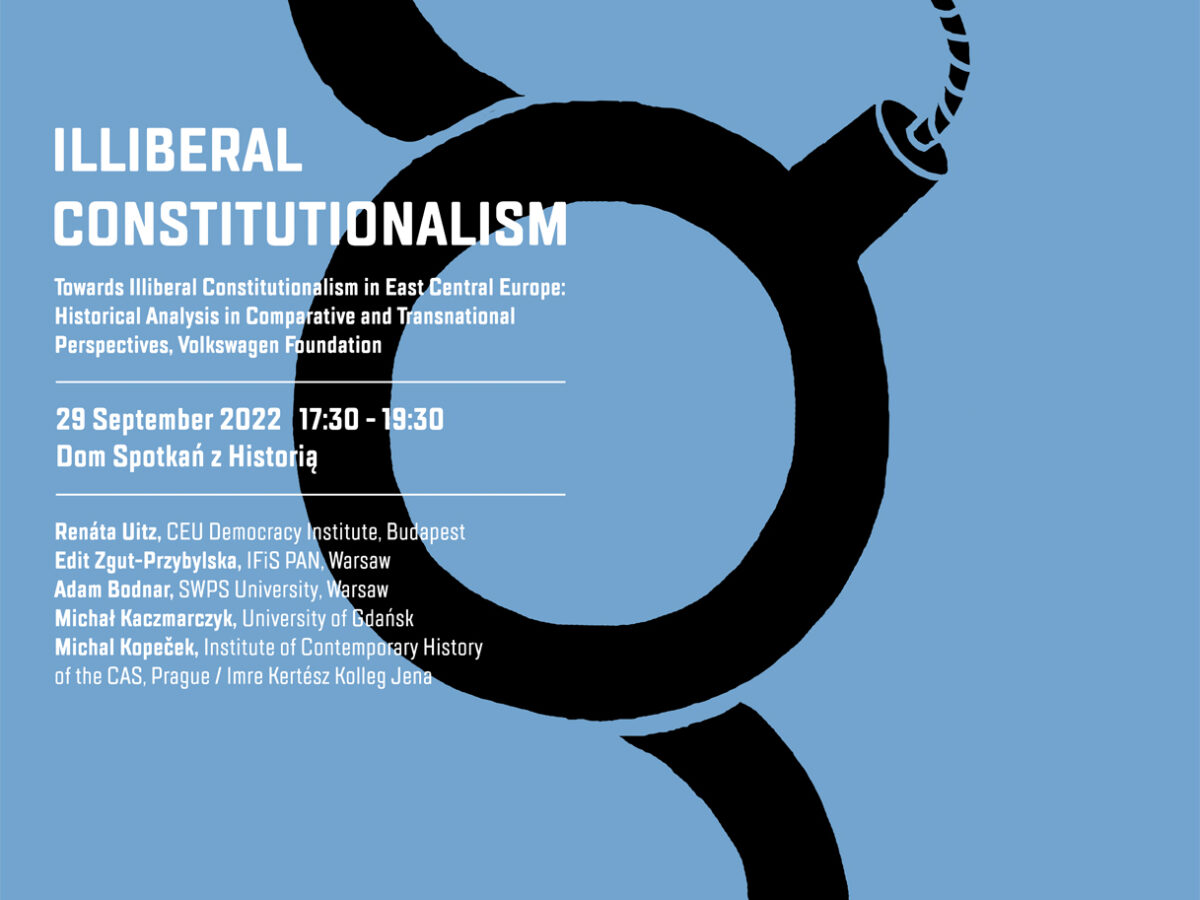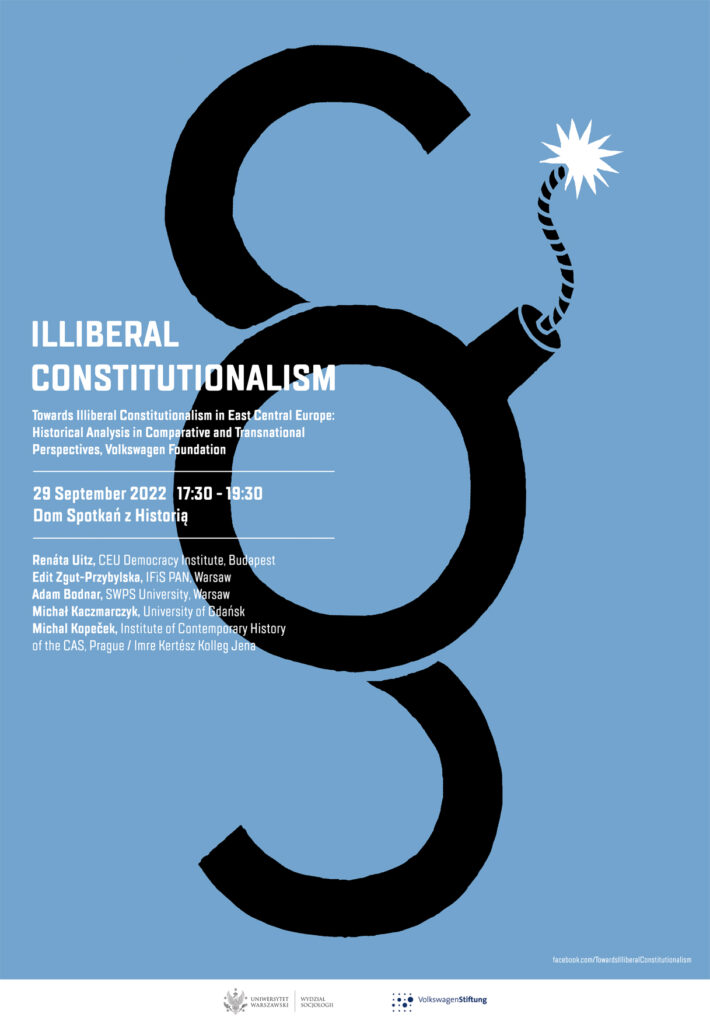
Warsaw Expert Forum
29/09/2022
The Warsaw Expert Forum, which will take place on 29 September at Dom Spotkań z Historią, is the first in the series of forums of the „Towards Illiberal Constitutionalism in East Central Europe: Historical Analysis in Comparative and Transnational Perspectives“ project.
The Forum aims at bringing together historians, legal scholars, justice practitioners and political stakeholders to discuss the pressing issues of the role of rule of law in democratic transition and the challenges of illiberal authoritarianism in national, European, and global scope.
The forums are planned to take place in the cities of all the project partners (University of Jena, University of Erfurt, Institute of Contemporary History Prague, Democracy Institute CEU Budapest, and University of Warsaw).
The first Warsaw forum will focus on recent Hungarian and Polish experience in broader European context.
Venue: Dom Spotkań z Historią, Warsaw, ul. Karowa 20
Date & Time: 29.09.2022; 17:30-19:30
In-person, no pre-registration needed
A small reception will follow the forum.
Questions to be discussed:
The rule of law and constitutionalism has been given a central role in the democratic transition in East Central Europe since the late 1980s. It plays a major role today, not as an unquestioned starting point but as a central point of political contention. Why?
We see the questioning of many of the primary structural foundations of liberal democracy in various places worldwide. How is the situation in our region specific?
Hungary and Poland have often been mentioned in the same breath as a symptom of the democratic crisis in our part of Europe. However, some commentators also highlight the differences between them. What are the main differences?
Liberal constitutionalism has been the main paradigm of the constitutional arrangements of countries in East Central Europe for several decades since 1989. However, from a historical point of view, it is a weaker link in the tradition; there are other, more robust traditions building – generally speaking – on the idea of a paternalistic Rechtsstaat with strong developmental elements. In this light, how to assess the current developments in Poland, Hungary, and the region?

Participants:
Prof. Renáta Uitz is professor of comparative constitutional law at the Department of Legal Studies and co-director of the CEU Democracy Institute. Her major research interests lie in transition to and from democracy, the protection of individual autonomy and religious liberty. She is a co-PI in the multidisciplinary research network investigating the origins and iterations of illiberal constitutionalism in East Central Europe, funded by the Volkswagen Stiftung (2021-25), where her work traces the emergence of illiberal Christian democracy. Her latest book publication is the Routledge Handbook of Illiberalism (Routledge 2021, co-edited with András Sajó and Stephen Holmes).
Edit Zgut-Przybylska is a political scientist and a doctoral researcher at the European Studies Unit in IFIS PAN in Poland. She is a re:constitution Fellow 2022/2023 and a Visegrad Insight Fellow. Edit also holds the position of a Vice-President of Amnesty International Hungary. Prior to moving to Poland, she was an Analyst at Political Capital Research and Consultancy Institute. She also worked as a foreign policy journalist at various Hungarian media outlets. Her research focuses on informal power and populism in the context of Hungarian and Polish democratic backsliding.
Prof. Adam Bodnar is a lawyer specializing in constitutional law and human rights. Since March 2020, he is a professor at the SWPS University of Social Science and Humanities in Warsaw where he researches and lectures on rule of law, human rights and constitutionalism, and since August 2021 he is Dean of the Law Faculty of the SWPS University. He is also visiting professor at the University of Cologne. He has held the position of the Commissioner for Human Rights of the Republic of Poland from September 2015 to July 2021. He is a former Vice-President of the Helsinki Foundation of Human Rights (2010-2015). Throughout his career, he has been working with many NGOs. Currently he holds advisory positions in International IDEA, Liberties, World Organization Against Torture and World Justice Project.
Prof. Michal Kaczmarczyk studied law and sociology at the University of Gdansk and received his Ph.D. in Sociology in 2004 at the Nicolaus Copernicus University in Torun. He was appointed assistant professor at the Institute of Philosophy and Sociology at the University of Gdansk. In 2010 he received a Kosciuszko Foundation Scholarship and taught at the University at Buffalo in 2011-2012. In 2013 he received his habilitation at the Jagiellonian University in Cracow and was appointed associate professor at the University of Gdansk. During his academic work, he was awarded several scholarships including research stays at Max-Weber-Kolleg in Erfurt (2008, 2020), Albert Ludvig University Freiburg (2014), Swedish Collegium for Advanced Study in Uppsala (2015-2016), and the University of Copenhagen (2018).
Moderator:
Dr Michal Kopeček is a historian, the head of the History of Ideas and Concepts Department at the Institute of Contemporary History in Prague and co-director of Imre Kertész Kolleg, Friedrich Schiller University, Jena. Among others, he was Leverhulme Vising Professor at the University of Cambridge in 2021 and 2022 and Visiting Professor at the Central European University in 2015. His research interests include the comparative modern intellectual history of East Central Europe, nationalism studies, history of state socialism and communism and the study of transition and democratization processes. Currently, he is working on his book project ‘Dissident Legacy in Post-Socialism’ focusing on Czechia, Hungary, Poland and Slovakia.